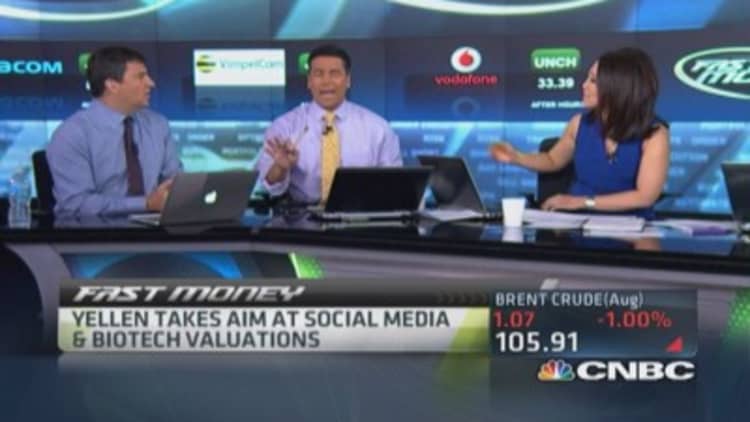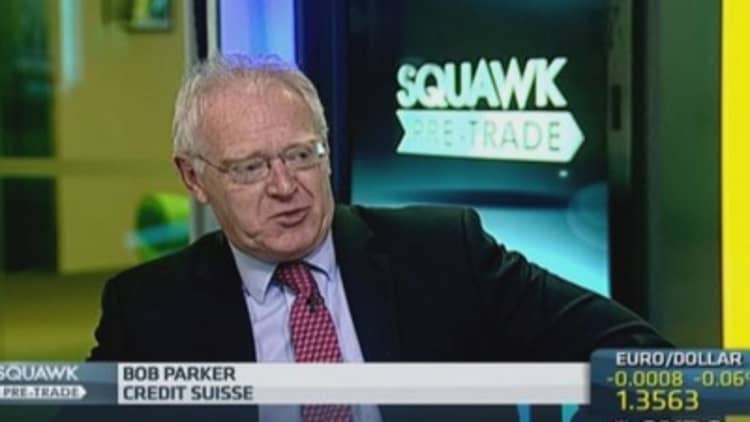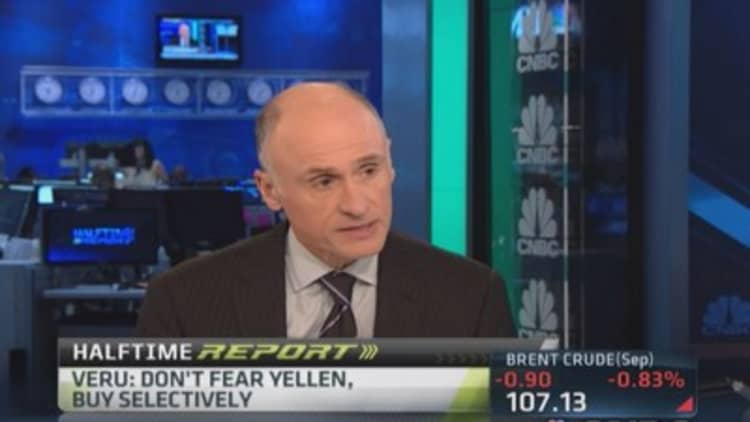The Federal Reserve chair has made a career of being great at predicting interest rates, but when it comes to stock calls—her newest vocation—she's off to an uncertain start.
Janet Yellen may want to keep her day job.
Almost four weeks and one earnings season have passed since Yellen's Fed made the mid-July observation that valuations of smaller social media and biotech companies were "substantially stretched,'' sparking a selloff in both sectors, a fleeting panic that, in retrospect, wasn't warranted.
Second-quarter social media earnings beat expectations broadly, suggesting the near-term ceiling is higher for Internet profits than skeptics think. The biotech sector has been relatively stable, too.
In Yellen's defense, social media stock outperformance was driven by the better-known social networks rather than smaller names she specifically (if vaguely) cited. The top three social networks—Facebook, Twitter and LinkedIn—all beat forecasts and raised their guidance for the rest of the year.
Read More
"In the long run she's going to be right about more than 50 percent of the stocks," said Josh Spencer, portfolio manager of the T. Rowe Price Global Technology Fund, which owns shares of business-to-business social-networking leader LinkedIn. "But when you're wrong, you're really wrong.''
A Bloomberg article written in the aftermath of Yellen's stock call included "ETFs to avoid" if you didn't want to take Yellen on. The Global X Social Media Index ETF (admittedly using a broad definition for social media) is up near-6 percent in the past month, while the SPDR S&P Biotech ETF is up 4 percent in the past month and the iShares Nasdaq Biotechnology ETF, even being down 1 percent, has declined no more than the S&P 500 over the same time period.
Giving a beating to the street
The push in social-networking companies' performance reflects good results from Internet companies in general, including most but not all of the small social media businesses, said Cantor Fitzgerald web analyst Youssef Squali. Through Aug. 7, 84 percent of Internet companies that had reported second-quarter results beat Wall Street revenue forecasts, the best performance in six quarters, Squali said. Just under 80 percent beat forecasts for profit before interest, taxes and noncash charges (EBITDA).
All five of the biggest social stocks Squali tracks—Twitter, Facebook, LinkedIn, restaurant-review site Yelp and hotel-review site TripAdvisor—beat second-quarter revenue forecasts, and all but TripAdvisor topped their projected profit. TripAdvisor and Yelp have, if anything, tried to help Yellen's call.
TripAdvisor, which has fallen 9 percent since July 14, said it would earn less than analysts thought this year as it boosts spending on TV ads and ramps up its newly acquired French restaurant-reservation site. Yelp's stock has lost 2 percent in the past month.
Yellen's observation had good company among prominent value investors. Noted short-seller Doug Kass wrote on TheStreet.com that he planned to go short on social media and other "new technology" shares, saying there are too few advertising dollars available to support today's valuations.
"Real profits will have to come to support all these hundreds of billions of dollars in equity prices that early investors will look to cash out a realized return on in coming years," Kass wrote.
Read MoreFour tech stocks that could have hidden value
Canadian investment titan Prem Watsa, chairman and CEO of Fairfax Financial Holdings, wrote to investors: "This sort of speculation will end just like the previous tech boom in 1999, 2000—very badly!''
Even a Silicon Valley titan, Oracle chairman Jeffrey Henley, told CNBC that "it feels a little bit in some of the markets, like social media and the cloud area, a little bit like the bubble 10 years, 15 years ago."
Those with an institutional market memory might recall that in 1996 Alan Greenspan, the then Federal Reserve chairman, talked about the "irrational exuberance" of the market and told people to be careful about stocks. Whoever sold out that day would have lost out on nearly four years of stellar returns.
It's a lot easier to place blame on investors for searching for returns in high-growth companies than for the Fed to criticize itself for the distortions it has made in keeping monetary policy so loose for so long.Kathleen Smithchairman and co-founder at Renaissance Capital
The debate over Yellen's comments highlights another dilemma: Not everyone agrees on what constitutes a social media company. Watsa's list included streaming movie service Netflix, while the Solactive social media index that serves as the basis for the Global X Social Media Index ETF includes Google.
Many companies commonly called "social media'' are hybrids of more traditional e-commerce businesses, with some tacked-on social features, such as those that let Pandora Media users share songs or Groupon users get discounts on the site's daily-deal offers for referring friends. Depending on which companies one includes, the data can support almost any conclusion social media shares, T. Rowe Price's Spencer said.
Mergers in the online space—of real estate sites Zillow and Trulia, which followed only a month after Priceline.com's buy of restaurant-reservation site OpenTable—show that strategic buyers see value in related businesses as well.
"There are really only three social companies—Facebook, LinkedIn and Twitter,'' Spencer argued.



Valuations in the Internet sector are aggressive and do rely on accounting tools other than generally accepted definitions of net income, but they are nothing like 1999 or 2000, RBC Capital Markets analyst Mark Mahaney said.
Back then, Yahoo shares traded for more than 1,900 times the earnings it ultimately delivered in 2000, while Mahaney said Facebook's now commands about 46 times this year's estimated profits. Even shares attracting more investor skepticism, like Yelp and Pandora, are likely to make enough by next year to lower their 2015 price-to-EBITDA multiples to 50, Mahaney said. Yelp has high gross-profit margins that will goose total profits as the company grows, he added.
"If you look at Facebook, it's just gushing cash,'' Mahaney said.
Even Twitter, which lost $277 million in the first half of the year under standard accounting rules, had an operating cash flow of $124.4 million, up 12-fold from last year. The company reinvested most of it in product development.
Read MoreA $15 trillion dream of GE-Google hybrid
Analysts' targets also assume no more than five more years before profit growth at social media companies slows to the same pace as the rest of the economy, Squali said.
Stretched valuations—or stretching the truth?
Losses in social media stocks since Yellen's remarks have been biggest in companies that were already out of favor, like daily-deal sharing site Groupon and former social-gaming leader Zynga. Both missed second-quarter forecasts and were punished by the market, extending Zynga's loss since early 2012 to 82 percent and Groupon's drop from its 2011 peak to 81 percent.
Some economists praised Yellen for paying attention to even a small hotspot of speculation, even as they downplayed the risk. The social media sector, especially without the Big Three of Facebook, LinkedIn and Twitter, is too small to become a systemic problem, so Yellen probably "fingered these stocks to show that policymakers are carefully monitoring for potential bubbles,'' Moody's Analytics chief economist Mark Zandi said.
Others were less kind.
"It's a lot easier to place blame on investors for searching for returns in high-growth companies than for the Fed to criticize itself for the distortions it has made in keeping monetary policy so loose for so long," said Kathleen Smith, chairman and co-founder at Renaissance Capital. The Renaissance IPO ETF—which has Twitter as its No. 1 holding—is flat over the past month.
Read MoreTime to go to cash?
The month since Yellen spoke proves two things: Social media is growing fast enough in general that bubble talk can be misplaced, and investors can still get burned if they don't pick stocks carefully.
"Over time, you might not be able to make a living without very closely vetting the fundamentals,'' Spencer said.
—By Tim Mullaney, special to CNBC.com





